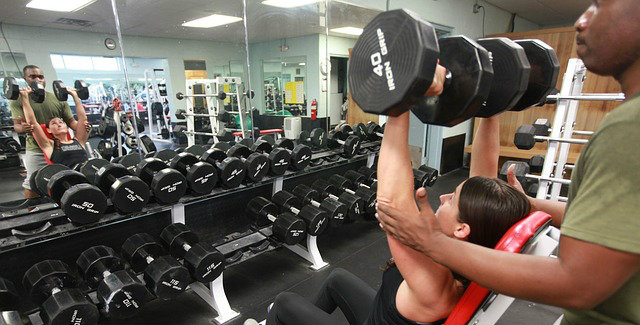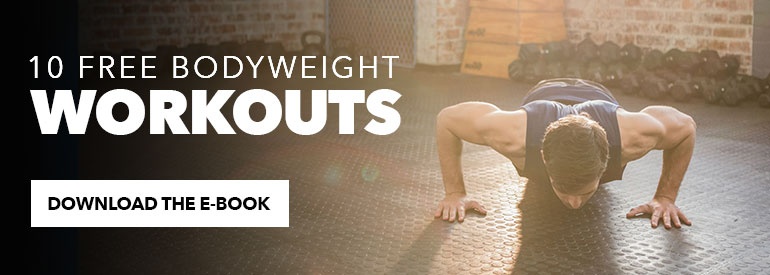 Reading Time: 7 minutes
Reading Time: 7 minutesEvery year, millions of Americans embark on a new fitness routine. While they may have different goals, aspirations, and preferences, most share the same dilemmas, namely:
- Making the commitment
- Sticking with it
With the hectic pace of modern life, getting to the gym is no small task. But as difficult as starting a new regimen may be, sticking with it is arguably the more difficult endeavor. Returns diminish, results become more difficult to achieve, and novelties wear off. Staying on track is challenging.
To avoid burnout and plateau, change is the name of the game. But switching things up often runs counter to human nature, as we are hardwired to our routines. And while forming an exercise habit is admirable, simply repeating the same pattern day after day doesn’t bode well for lasting success in the gym. Fitness is as much about breaking the cycle as getting your reps in.
Forcing yourself to switch it up can be an uphill battle. Hiring a fitness professional can be a spark in helping inspire, inform, and dictate change. But perhaps that seems just as daunting as making your commitment to begin with. How do you find the right person to guide you?
Here are five important things you should look for to hire a trainer who will properly support you in your journey of getting and staying fit.
1. Expertise
Clearly, if someone is going to instruct you in how to do something, he or she should be pretty darn learned in said subject. Your coach should know the ins and outs of anatomy, exercise physiology, and functional movement.
Unfortunately, simply holding a national certification isn’t enough to guarantee your coach knows his or her stuff. These days, there are plenty of fly-by-night certifications and those individuals who will try to sell you a bill of goods under the title of “health coach.” But being an “expert” is a lot more than just calling yourself one or providing a piece of paper that says you passed a test.
Takeaway: Interview your prospective trainer before you sign anything. As a potential customer, you need to dig a little deeper into what your coach knows and where he or she learned it from. A good place to start is to ask the trainer to discuss his or her educational background, define his or her training philosophy, and cite references and examples in terms of professional success.
2. Listening Skills
A great salesperson is less of a fancy talker and more of an effectual listener. The only way to truly meet the needs of a prospect is to identify and understand those needs.
The same logic applies to coaching. As trainers, we get that you want to “tone up” and “get in better shape.” But a great trainer will push you to dig deeper to uncover what is really driving you. Your trainer should not only talk the talk, but more importantly, be adept at listening and getting you to open up about what truly moves you.
Takeaway: In the same way you should interview your trainer, you should also find one that “interviews” you. Look for an introspective coach who provides pearls of wisdom, asks great questions, and demands you do the same for yourself.
3. Passion
I’m not looking for any sympathy, but being a trainer isn’t an easy job. Coaching can be both physically and emotionally exhausting, and it’s certainly not a job for the faint of heart. Yet, I happily called it my profession for years and years because I was called to. This means walking the walk both personally and professionally. It means having a passion for fitness.
Theoretically, your brain surgeon can still be a great doctor, but an unhealthy person. Similarly, your lawyer can represent your best legal interests and not necessarily be a law-abiding citizen. But an effective trainer must be able to inspire and motivate, and in doing so must walk the walk. You simply cannot be inspiring without being inspired.
One caveat: it’s tempting to judge the quality of a trainer by the aesthetic. Don’t mistake looking fit for passion (or health and expertise, for that matter). Looking fit is not the same as being fit, and it certainly isn’t the same thing as being healthy.
Takeaway: Look for a trainer who exudes passion and demonstrates both fitness and wellness in his or her lifestyle. This should be easy to spot. While you can fake what you know with BS or even look the part through good genetics or manipulation, you can’t fake an authentic sense of passion. Make sure your coach has it.
4. Excellent Communication Skills
Did your favorite coach or teacher growing up have fancy degrees? Were they a professional athlete or Julliard graduate? You likely don’t remember and I’m guessing you probably didn’t care. While an esteemed background may be impressive, one thing it doesn’t necessarily translate to is effective communicating and teaching. A good coach must be adept at inspiring and motivating and to do so, he or she must not only excel in the science of Xs and Os, but also in the art of teaching.
Case in point: Elgin Baylor, Isiah Thomas, and Magic Johnson are all Hall of Fame basketball players, but despite their basketball pedigrees, all three are widely considered poor professional coaches. The moral of the story is that a great basketball player does not equal a great basketball coach. The same analogy holds true in fitness. Fancy certification or degree, professional bodybuilder, or former college athlete doesn’t equal proficient trainer.
Instead of looking at what your coach has accomplished, look first at how he or she communicates. My favorite martial arts teacher never graduated high school. But he was a passionate teacher who innately understood the balance of how far to push people before losing or breaking them. That wasn’t something he learned in school, but a quality and talent honed by experience, empathy, and a deep understanding of motivation.
Takeaway: A great coach is part scientist and part artist. The science is easy to quantify as proficiency of knowledge. But the art of communicating and demonstrating that knowledge is of equal importance. Your coach can have all the knowledge in the world, but that won’t help you understand the material and excel unless that coach can find a way to convey that knowledge in a way that resonates.
5. Empathy
Odds are your trainer is fit and you’re not. This obvious potential disconnect can be a sticking point if there isn’t a prevalence of one of the most important human qualities — empathy. I once heard empathy describes as “feeling with someone.” This means not only does your trainer recognize and comprehend how you feel, but he or she also appreciates and identifies with your plight on some level.
Maybe your trainer doesn’t know what it is like to be overweight or deconditioned, but just because your trainer is fit doesn’t mean he or she can’t understand what it means to lack health, feel intimidated, or experience trauma. What’s vital is that your coach feels your pain figuratively — meaning he or she gets where you’re coming from and what you’re going through.
Takeaway: Look for a trainer who has humility, compassion, and the ability to relate to others. Human beings respond best when they feel understood.
Are You Ready to Hire a Trainer?
I studied martial arts and boxing for years and most of my practice was learned in a group and class setting. But when I invested in a private one-on-one coach, it forced me out of my comfort zone and took my game to the next level. Fortunately, I found someone who wasn’t just a boxing expert, but a coach who expressed both wisdom and understanding.
Similarly, the right fitness trainer or athletic coach might be the missing ingredient in helping you reach your goals. But before taking the plunge and hiring a fitness professional, make sure your coach is a “triple threat” — part scientist, part artist, and part compassionate teacher. If you hire a trainer who is great at his or her job and a true mentor, the investment will be well worth it.













